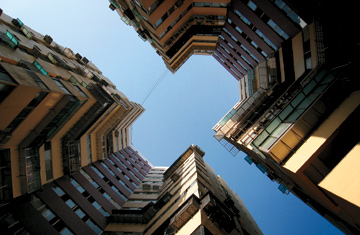
Stumbling block Yang pilloried Taipei's bland, functional architecture
Near the end of Taipei Story (1985), Lon, a washed-up former pitcher for the Taichung Golden Dragons stuck working for a family textile company, takes a taxi to his dad's house on the sulfurous slopes of Yangmin Mountain, north of the city. Noticing a rival-in-love following behind on a motorcycle, he has the taxi stop, and in a brief scrum, Lon, played by Hou Hsiao-hsien, is stabbed in the gut. He buckles on a curb, leaking blood all over it and his khakis, chuckling madly to himself. Why? He is hallucinating that a junked TV in a nearby mound of trash is broadcasting scenes from a Little League World Series victory by the Taiwan team, making a mockery of his own personal failures.
The biting second feature from the late Edward Yang distills the Taiwan New Wave director's bitter view of the capital. Taipei's boxy skyline is so uniform that an architect in the film admits he forgets which buildings are his. It's also a place of borrowed American culture that's obsessed with the achievements of its children while being cold and comfortless toward those who fail or just don't fit. Take A Brighter Summer Day (1991), Yang's 3 1/2-hour epic set in 1960 and often likened to a Taiwan West Side Story. In it, greasers from two teenage neighborhood gangs, the Little Park Boys and the 217s, with such urbane noms de guerre as Panty, Sly and Threads, battle for turf and girls, using baseball bats as instruments of war. The movie's title comes from a misheard lyric in Elvis Presley's "Are You Lonesome Tonight?" — a song that the runty, doo-wopping Cat records for his friend S'ir, the bristly protagonist jailed for murder shortly after being expelled from Taipei's Jianguo High School.
That prestigious preparatory institution is Yang's (and current President Ma Ying-jeou's) alma mater, and presumably also that of NJ, the introspective middle-aged father in Yi Yi: A One and a Two (2000). It's a brilliant, beautifully tender feature that's part Tolstoyan unhappy family drama and part portrait of the artist as a young shutterbug. Hanging in NJ's dining room is a framed oil of Jianguo High's main building, set above a bureau strewn with wine bottles and a box of Courvoisier. Japanese architects built the school in the same red brick Renaissance-Baroque style of Taipei's Presidential Palace, a 10-minute walk north of Jianguo and just a block from Taipei's First Girls' High. That's where NJ's pensive teenage daughter Ting-Ting goes to school. That is, when she's not going for awkward sodas at N.Y. Bagels, or attending recitals at Zhongshan Hall with Fatty, whose twiggy frame and homicidal tendencies mirror S'ir's in A Brighter Summer Day.
In the first half of Yi Yi, for which Yang won Best Director at Cannes in 2000, we see Ting-Ting acting as a go-between, accepting notes from Fatty during meetings under the highway overpass in front of her family's apartment complex. She passes these missives on to his girlfriend (her close friend and neighbor). Their gray, twin-towered high-rise is on Section 1 of Xinhai Road in Da'an, a district of universities and cram schools that is also home to Longan Elementary. There, a browbeating teacher picks on Yang-Yang, Ting-Ting's 8-year-old younger brother, accusing him of taking a condom to class. It's actually a pink balloon, and later, in a wonderfully mischievous scene, Yang-Yang fills it with water and plops it on the teacher's head.
It's no coincidence that the endlessly endearing Yang-Yang's name is a doubling of the Taiwan auteur's own. Yang-Yang goes around quietly snapping photos of the back of people's heads, explaining to his uncle, "You can't see it yourself, so I help you." Just so, Yang, who died in 2007, uses Yi Yi to help Taipei see how its rigidly Confucian educational and social system stifles natural creativity. "People in the arts are not much better than some whore down the street," Yang once told an interviewer, explaining the pressures he felt as a young man in Taipei to pursue an electrical-engineering degree over his dream of being an architect. Only after moving to America, where while living in Seattle as a computer designer he saw an epiphanic screening of Werner Herzog's Aguirre, the Wrath of God, did he resolve to be a filmmaker. But while his critical reputation abroad was long ago secured, DVDs of Yang's movies are still nearly impossible to find in the city of his rearing. In Taipei, it seems, they're too busy studying to notice.
Got an awful travel gripe? The Avenger may be able to sort it out for you.
